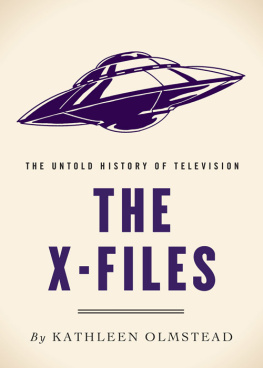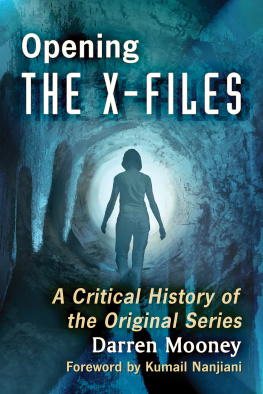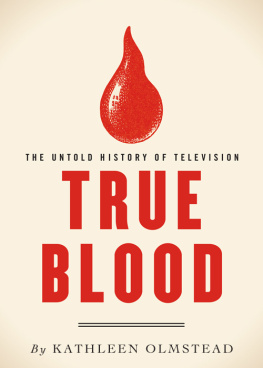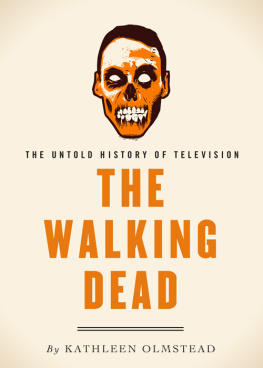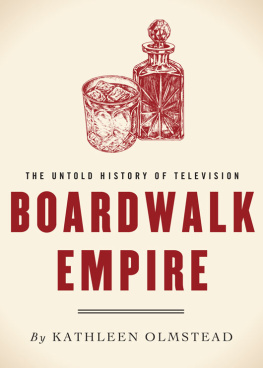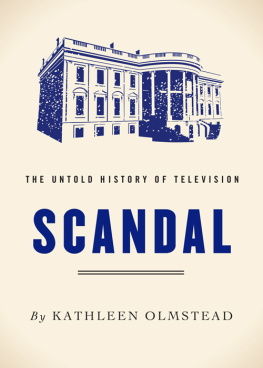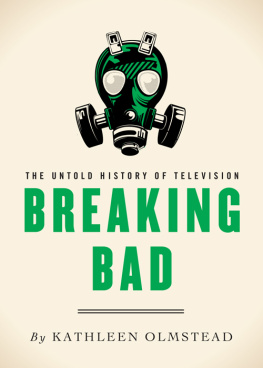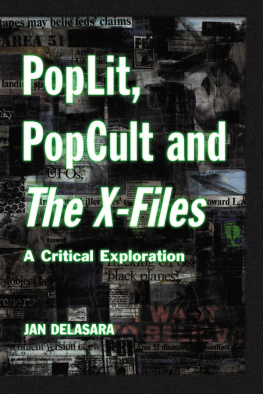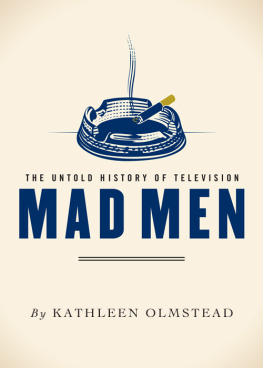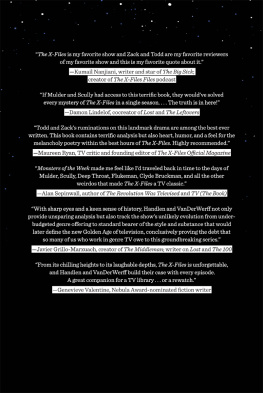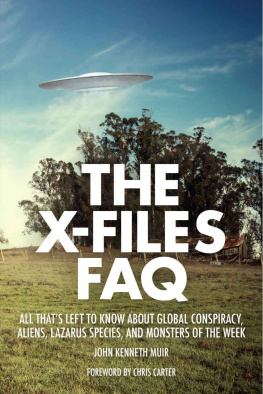The X-Files is such a familiar and ubiquitous part of television culture that its easy to overlook its influence. More than twenty years after its debut, we tend to forget what television, science fiction, fan conventions, and fandom were like before 1993. The X-Files is thought of as a science fiction series that sometimes branches out into horror or comedy, but the truth is that The X-Files effect is felt across genres. Detective and procedural dramas, prestige series like Breaking Bad and Homeland, cult and fan favourites like Lost and Fringeall of these have been directly influenced by The X-Files. The show was a focal point for how people engaged with the Internet and with each other and for how artists and networks interacted with their audiences. The world of 1993, when the show first aired, was vastly different from the world that existed when the series ended in 2002. When The X-Files premiered, the Internet, cellphones, and personal computers werent yet commonplace. We didnt have instant access to information. The fringe element of those interested in conspiracy theories, UFOs, or the paranormal was exactly that: on the fringes. By 1993, though, things were starting to change, and The X-Files proved to be the perfect television show for this growing community. It captured the publics imagination because there was nothing else like it on television and people were hungry for a topic that interested them. The X-Files remains one of the most influential shows on television to this day because it and the new online world grew up together.
The X-Files wasnt the first television show to consider the possibilities and consequences of an alien invasion. Other shows had done so before, from the serious (V [198385]) to the clever (Alien Nation [198990]) to the camp (ALF [198690]). Likewise, science fiction stories had been airing on television for almost as long as people owned television sets, although most sci-fi stories traditionally took place in outer space, like Buck Rogersin the 25th Century (195050, 197981), Lost in Space (196568), Star Trek (196669) and Star Trek: The Next Generation (198794), Doctor Who (196389), and Battlestar Galactica (197879) and Galactica 1980 (1980). Stories about the paranormal, the weird, and the unexplained, like TheTwilight Zone (195964, 198589), The Outer Limits (196365), and Night Gallery (196973), fascinated audiences with thinly veiled parables about morality and justice, or with good old-fashioned ghost stories. There was even a long-running soap opera, Dark Shadows (196671), that was about vampires and gained a devoted cult following that still meets at fan conventions today.
What The X-Files did was to bring all these elements together by mixing sci-fi with the paranormal in a conventional dramatic format and adding a layer of government conspiracies and cover-ups. Perhaps most importantly, it told stories that were well written, with interesting and developed characters. The relationship of the two leads was at the centre of the series, but The X-Files wasnt dependent on romance, at least not in the stereotypical sense. Nor was the authority, intelligence, or gender role of the female protagonist questioned in the show. The characters werent objectified or dressed in too tight and revealing outfits. The X-Files wasnt afraid to be weird, smart, sexy, or funny. It didnt limit itself to one narrative structure or story arc. All this resulted in a series that was a breeding ground for new writers and that redefined storytelling in television dramas. And yes, its main plot line involved alien colonization and a species of shape-shifting alien super soldiers.
The television landscape was relatively simple in 1993. A number of specialty channels like MTV, Comedy Central, Cartoon Network, and AMC (known at that time as American Movie Classics) launched during the 1980s. Subscription services like HBO and Showtime were gaining more traction and expanding their original programming options. But it was still a threebroadcast network kingdom, with ABC, CBS, and NBC controlling the vast majority of the market. There was much less competition for programming, and ratings numbers were expected to be high. Sure, VCRs might have cut those numbers slightly (as soon as we had the option to watch one show and record anotherat the same time!there was less of a need to watch everything as it aired), but the big three still held sway over the airwaves.
In 1985, a new network entered the field. Rupert Murdochs News Corporation acquired television stations in major US cities and launched the Fox Broadcasting Company, a subsidiary of 20th Century Fox. Competing with the big three networks was a bold move. Fox first went to air in October 1986 with a mix of original and syndicated programming. They had a number of hits in their first decade, largely because they took chances on unusual or slightly offbeat shows. Married with Children (198797) pushed boundaries with crude and rude humour during prime time. 21 Jump Street (198791) presented the odd premise of handsome police officers posing as high school students. Beverly Hills, 90210 (19902000) and Melrose Place (199299) brought nighttime soap operas with outlandish and mesmerizing plots to the young adult demographic. And The Simpsons (1989present) reintroduced animation to prime time. Fox produced documentary-style shows like Americas Most Wanted (19882012) and the late-night fixture Cops (1989present) that featured hand-held cameras trailing police officers in various cities as they talked to, chased, and arrested low-level criminals. (This series was brilliantly parodied on Mr. Show with the Ronnie Dobbs story and also in the season seven X-Files episode X-Cops.) And yet, eight years after debuting, Fox was still trailing in overall ratings behind the big three. Like every other network, they were looking for the next big hit. Unlike the other networks, they were willing to take less obvious routes.
The Origin Story
Born in 1956, Christopher Carl Carter had a pretty typical upbringing. The son of a construction worker and a stay-at-home mom, Carter was an early fan of detective shows like Mannix (196775) and anthology series like The Twilight Zone. A particular favourite was the television movie The Night Stalker (1972) and its sequel, The Night Strangler (1973), starring Darren McGavin as Carl Kolchak, a Las Vegas reporter investigating suspicious supernatural phenomena.
Carter studied journalism at California State University, Long Beach, then went to work at SURFINGMagazine. At the time, he considered this his dream job, and he travelled the world, talking to surfers and developing his writing skills. Soon, however, Carter was drawn to the idea of writing fiction. His then partner and future wife, Dori Pierson, herself a successful screenwriter, encouraged him to try his hand at writing scripts.
In the late 1980s, Carter got a job at Disney just as Jeffrey Katzenberg and Michael Eisner took over the company. Carter wrote for

